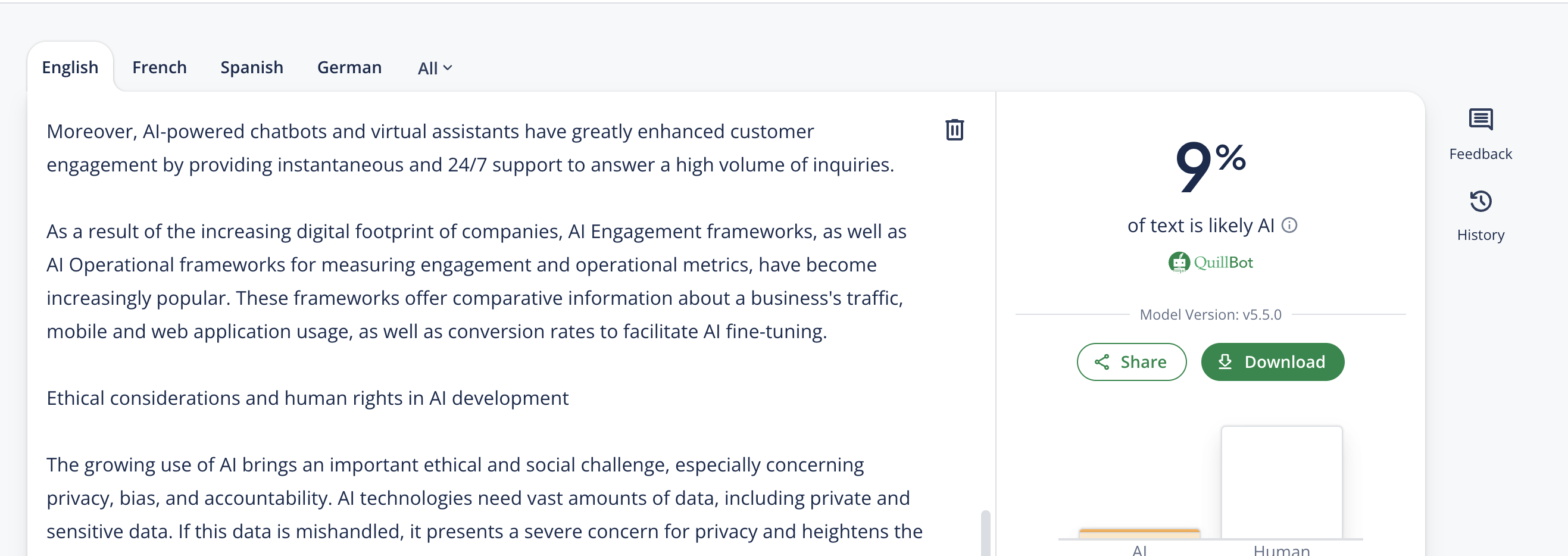
AI is changing the way businesses operate around the world and raising important ethical and human rights issues. Global investment in AI technology is expected to grow to over $520 billion in August 2025, up from $320 billion just two years ago. This acceleration in investment reflects the growing dependence on AI in critical fields such as manufacturing, finance, public governance, healthcare, and policymaking.
This article discusses these investment trends and the evolving AI technologies, while addressing the transformation of business models and the human rights challenges AI has introduced. It also explores how organizations can use data analytics and benchmarking tools to navigate and adapt to these changes.
The rise of artificial intelligence in modern industries
AI has now become a significant part of the competitive strategy businesses need to employ, and as the ongoing warfare for workplace relevance is tightening, organizations need to understand how to stay alive in the market. The increasing complexity of digital ecosystems, alongside the growing adoption of AI, has compelled many businesses to use benchmarking tool to check their performance in comparison to their competitors.
These tools can have crucial coverage regarding digital engagement, technology adoption, and operational processes, enabling organizations to measure their productivity. Understanding technology and the use of AI in business processes is indeed critical as businesses try to manage their productivity performance.
Impact of AI on global business models
AI technologies have become essential in multiple sectors, paving the way for innovation and efficiency. The manufacturing industry, for instance, has readily adopted the use of AI-based robotics and automation systems. These technologies perform repetitive and precision-driven tasks far more reliably than human operators, reducing the rate of errors and speeding up the production cycle.
New information from the industry suggests that AI has increased productivity in automotive manufacturing by more than 25% from 2023 to mid-2025. This improvement is the result of not only faster assembly lines but also the early AI systems’ early defect detection capabilities, which reduce waste and rework.
One more sector of the economy that is going through a strong change because of AI is healthcare. Cutting-edge algorithms are much more effective at analyzing vast datasets from imaging, genomics, and patient histories to assist with early and accurate diagnosis. For instance, AI-powered diagnostic engines now assist in the detection of cancers and cardiovascular diseases much earlier in the progression of the diseases, when interventions are more effective.
Moreover, AI has the potential to refine therapies to be offered by suggesting them based on a patient’s genetic profile and anticipated responses to the medication. AI technologies also help in the non-clinical areas of healthcare by automating workflow systems that manage scheduling and billing, thus improving efficiency and lowering costs.
AI technology is now integrated within the financial services sector, aiding in fraud detection, risk assessment, and customer service. Advanced AI models bolster security by analyzing transaction patterns and flagging suspicious activities in real-time, allowing for sharper and faster detection of sophisticated cyber threats.
The evaluation of the credit risk has also become more advanced and non-traditional, because more non-traditional data sources are being considered, enabling wider access to financial services. Moreover, AI-powered chatbots and virtual assistants have greatly enhanced customer engagement by providing instantaneous and 24/7 support to answer a high volume of inquiries.
As a result of the increasing digital footprint of companies, AI Engagement frameworks, as well as AI Operational frameworks for measuring engagement and operational metrics, have become increasingly popular. These frameworks offer comparative information about a business’s traffic, mobile and web application usage, as well as conversion rates to facilitate AI fine-tuning.
Ethical considerations and human rights in AI development
The growing use of AI brings an important ethical and social challenge, especially concerning privacy, bias, and accountability. AI technologies need vast amounts of data, including private and sensitive data. If this data is mishandled, it presents a severe concern for privacy and heightens the potential for abuse. AI algorithms are also biased due to the nature of their training. If the algorithms are trained on historical data without proper data filtering, they reinforce or amplify social biases.
Several international human rights organizations are concerned that AI technology designed for sensitive functions in recruitment, credit scoring, or law enforcement breaches fundamental human rights due to the use of discriminatory algorithms.
There are also well-documented cases of AI recruitment systems which favored and trained on candidates of a certain gender or ethnicity for recruitment. Also, certain AI systems for facial recognition have wrongly identified people due to biased algorithms trained on limited data, making them prone to error for certain demographics.
To ensure fairness, transparency, and human rights considerations during AI development, strong ethical principles need to be put in place. Of singular importance is transparency, as many AI models work as “black boxes” where even their creators find it extremely challenging to interpret the underlying logic for the decisions made. This lack of clarity is a barrier to auditing, investigating AI-related harms, or offering appropriate remedies for those impacted.
Striving to improve the explainability of AI aims at designing AI systems whose decisions can be understood by users and regulators. This enhances trust and mitigates the risks of discrimination as well as the unwarranted results. Enhancing trust is particularly marked by the emergence of accountability frameworks, defined by impact assessments and continuous monitoring in the context of AI responsibility.
How data analytics drives smarter decision making
Optimising AI applications and ensuring ethical alignment in AI systems is a matter of primary importance for data analytics. Companies can now monitor their clients, operational processes, and even the market in real time thanks to digital platforms, which provide real-time data. These insights can be supplemented by benchmarking tools, which provide comparative data to indicate where a company stands concerning its industry peers.
As one example, an online store may seek to improve its AI-powered recommendation system by comparing it to those used by other stores. By assessing click-through rates or conversion rates, the retailer can optimize algorithms to improve sales and align better with what consumers want.
Additionally, advanced AI risk management can resolve certain risks in advance. Compliance monitoring with ethical standards, checking for anomalies, and demand forecasting all allow for the automated adaptation of AI systems. Such flexibility is critical for rapidly changing industries and legal frameworks.
With strategic planning, organizations can also set targets using refined data. Analytics can set forecast models for new challenges, optimize budget allocation, and set resource priorities. Benchmarking proves vital in these scenarios to account for competitors and technological advances.

E-E-A-T analysis
View details – click here
85%
| Order ID | 68796 | |
| Orderlink ID | 293258 | |
| Link | newsdailysources.com | |
| Language | English |
| benchmarking tool found 1 time(s) | |
| https://www.similarweb.com/corp/we… |
Article Images

Source: Bazoom

Source: pexels.com
